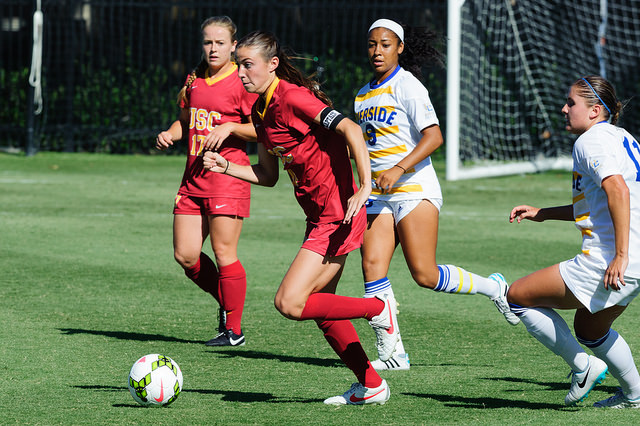Why Paying College Athletes Fairly Is Harder Than You Think

The NCAA makes more than $6 billion annually. Yet, the individuals mostly responsible for that revenue do not earn a single dime. The amount of time that student-athletes put in for their higher-ups to reap the benefits is downright criminal. College athletes should be paid, but is there a just way to do this?
The Ed O'Bannon trial against the NCAA was a big step towards paying student-athletes. O'Bannon's side won the case, as the judge ruled a trust fund will be set up for every college athlete to collect upon graduation. The athletes would be able to earn money from their respective universities or the NCAA for the commercial use of their image or name. So, whenever an athlete appears in a commercial or has his/her uniform sold, the trust fund would build up. The NCAA appealed the judge's decision, which is why this program hasn't been put in place yet.
The problem with this system is that there would clearly be a discrepancy between the amount of money received by male college football and basketball players versus other athletes. Most of the time, there is more public interest surrounding those two sports compared to other D-1 athletics. The athletic departments have a significant interest in those sports as well, as college football and college basketball are often the two biggest revenue-driving sports for a university.
But is it really fair to only reward the athletes that play a role in generating revenue for their respective athletic departments?
All student-athletes are making the same time commitment and sacrifices. They have to balance the academic rigors of college with the hours of practice and possible travel, which essentially takes away having a true college experience.
MORE: USC Athletes React To NCAA Vs. O'Bannon Ruling
What about student-athletes that are performing at a higher level of excellence in sports that generate lower revenue? Shouldn't athletes that are on teams that win national titles for the school earn money too? At USC alone, the men's water polo and tennis teams have won multiple national championships over the past decade. Athletic departments pride themselves on how many national titles are won in all sports, yet on a monetary level, athletes on the water polo and tennis teams would not be treated the same as those on the football team.
Looking at just the football team though, there would be payment discrepancies there too. Obviously the quarterback is a lot more likely to have his image used by the NCAA than the offensive linemen, and would receive a lot more money in his trust fund because of it. How would a team react if only a few marquee players received an abundance of cash from the NCAA, while the rest of the team that puts in the same commitment towards the team isn't earning nearly as much?
With young adults not even in their twenties on football teams, it's easy for a dispute to occur with an issue as petty as not earning the same amount of money. Would student-athletes even be motivated to play for their teams if they weren't getting the same monetary reward for their efforts as other players?
Then there's the issue of the difference in pay between genders. Female student-athletes don't come close to generating the same revenue from image use or jersey sales that male student-athletes do. So how would most, if any, of them earn money from the NCAA? Paying women less for doing the same work sounds awfully like a major problem in today's society right?
Also, isn't there a federal law banning discrimination based on sex at education programs? Oh yeah, Title IX. Title IX has helped women participating in college athletics receive the same treatment as male student-athletes and receive the same benefits as those athletes. It'd be pretty dicey if female student-athletes weren't receiving similar monetary benefits as males. How could universities say that they are treating both genders with equal respect and benefits if they weren't receiving the same amount of money for an equal amount of work?
So, while proponents of paying student-athletes think the athletes should get a slice of the pie, the truth is that only a small percentage of student-athletes at each school are even responsible for the pie in the first place. Sending a clear message that one athlete is more important than another is dangerous, and could result in fewer athletes playing their respective sports in college.
It's tough enough being a student-athlete, don't make it any more difficult by having them deal with a reality of some athletes being paid for their hard work and commitment while others are not.
Reach Senior Sports Editor Max Meyer by email.



